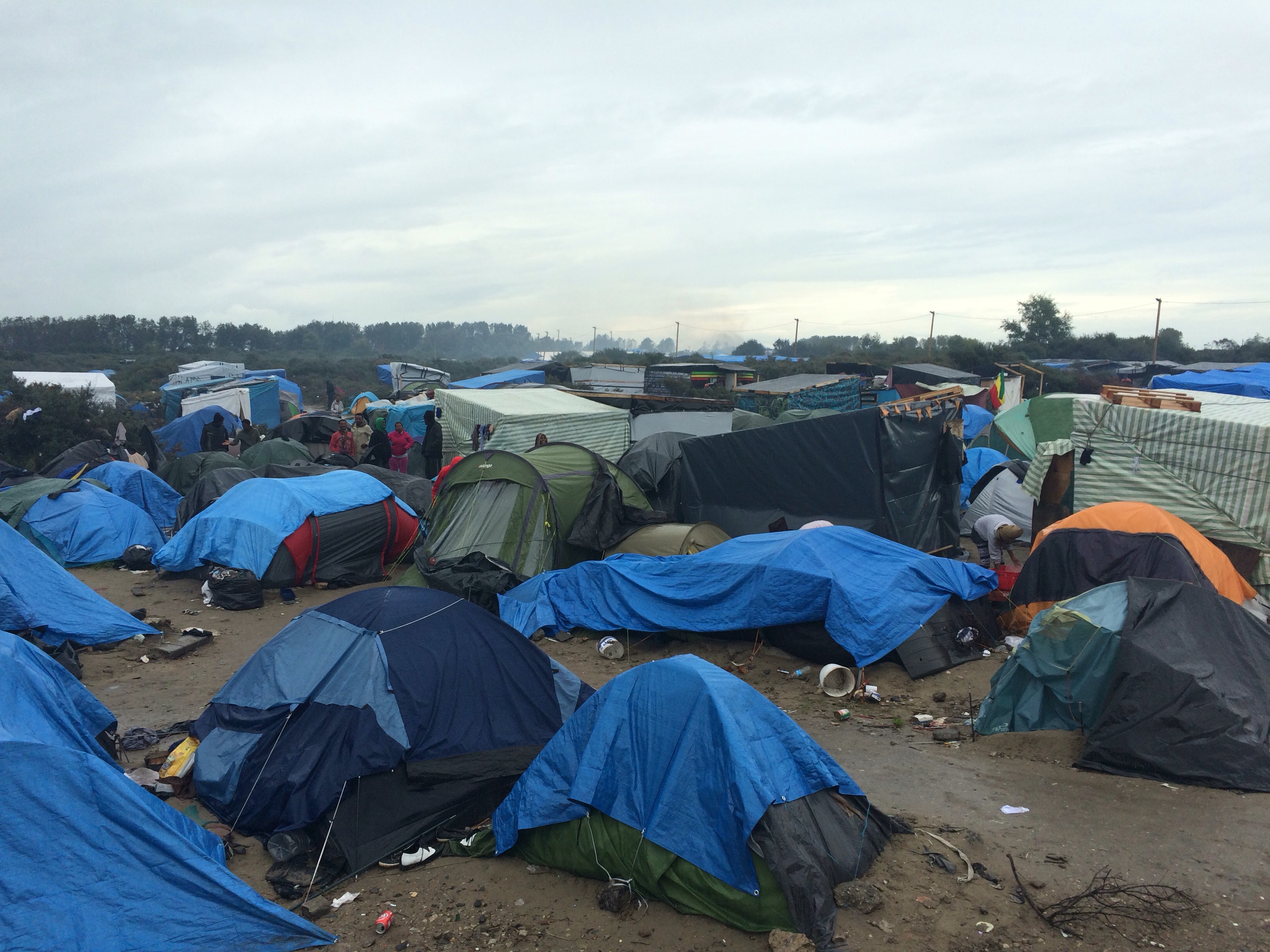Since the camp’s inception there has been an ongoing debate about whether camp-dwellers in Calais, France, were refugees or economic migrants, suggesting one warrants more sympathy than the other.I travelled from Birmingham to visit the camp with the Stand Up to Racism delegation and spoke to a few of the settlers to get an insight into why they made the perilous journey to Calais.
The ‘jungle’ camp is dirty and cramped with many of the camp-dwellers sleeping in flimsy tents which will probably not withstand the oncoming winter. The camp is situated in a country boasting the 6th-largest economy in the world, within close proximity of the Calais port but a far cry from the life beyond the barbed-wire fences.
Mohammed, 27, from Darfur in Sudan, fled from armed conflict. The war in Darfur has caused hundreds of thousands of deaths, prompting the International Criminal Court (ICC) to investigate war crimes, crimes against humanity and acts of genocide committed by the Sudanese government and rebel groups.
Mohammed, a former banker with a master’s degree in Economics, described the situation in his homeland as dire and escaped to find safe haven in the UK. Although he feels he is safer in Calais than in Darfur, he is unhappy and uncertain of his future.
Abdur Rahman, 23, from Deir Ez-Zor in Syria, admitted to have escaped conscription in his country, where all men are made to serve in the army at the age of eighteen for up to two years. He was captured by the Syrian regime and forced to kill, following the government’s increased efforts last year into the military reserve force after a substantial decrease in the number of men fighting under the regime, largely due to casualties and desertions.
Abdur was also interrogated by extremist organisation Islamic State of Iraq and The Levant (ISIL). He said boys as young as 10 were being targeted by the militia group to engage in the civil conflict.
Feeling trapped and caught amidst a war he wanted no part in, Abdur left his country and with that his wife. He couldn’t bring his wife because the journey to Calais would’ve ultimately killed her; he had seen people drown whilst crossing the Aegean Sea into Greece, many of whom were women and children.
Naseer Majidi, 24, from Kabul in Afghanistan, was unable to find work in the capital. War in the country has left many areas derelict, making it difficult for Afghans to earn and provide for their family. Naseer hopes to study and work in the UK and eventually return to his country once it is possible to lead a prosperous life there. But in order for Naseer to be granted asylum in the UK he must apply to the government for refugee status.
The 1951 Refugee Convention defines a refugee as a person who is unable to return to the country of their nationality or residence for fear of persecution and as such that country is unable to grant them protection. The United Nations High Commissioner for Refugees (UNHCR) was set up by the UN General Assembly in 1950 to protect the rights of refugees and it is estimated that there were 19.5 million refugees worldwide by the end of 2014.
Economic migrants are defined as people who emigrate in search of job opportunities and increased standards of living in a different country; fleeing poverty is the main motivation for this type of migration.
But the underlying causes of poverty in some countries are sometimes overlooked and what I discovered is that war is the definitive cause of the mass migration into Europe.
Countries like Afghanistan are struggling to recover from the aftermath of war, and political instability has caused migrants to follow the refugees into the developed world, some of whom are in Calais.
Millions of people have been displaced by current conflicts in Syria and Sudan but are afforded protection under the 1951 Refugee Convention and the UNHCR. Mohammed and Abdur Rahman fall well within the scope of the Refugee Convention but Naseer Majidi will fall foul of this process since it will be difficult for him to prove he is facing a real threat of persecution in Afghanistan.
Naseer explained how it is near impossible to apply for a work visa through immigration as he would need to prove he has enough wealth to be able to support himself in the UK, something which he, and many like him in Afghanistan, simply do not have. Both the asylum and immigration route into the UK are a dead-end but at least through Calais, Naseer explained, there have been successful attempts.
The media were for a long time at odds on whether to refer to the men, women and children crossing the European borders as refugees or migrants, which fundamentally lead to economic migrants being demonised for wanting to improve their standard of living. Fleeing persecution is regarded as a legitimate reason for granting asylum, poverty is not.
People like Mohammed, Abdur and Naseer head for the UK because they have family and friends here, and some even speak or at least understand basic English. Despite having left their countries for different reasons they all have one common goal in mind; to contribute to the economic growth of the UK whilst at the same securing financial stability to save themselves, their family and their country.


[…] The jungle in Calais; why are migrants in want of a secure life ignored? […]
LikeLike